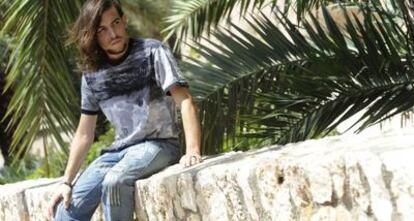"The sign? It was all a bit silly, really"
15-M protestor who appeared in iconic protest photograph plays down his role in the movement
With 200 euros in his pocket, 19-year-old Alejandro España (born in Alzira, Valencia in 1992) decided it was time to travel around Spain. "We were really broke," he says. "My brother told me he was going to leave home. My mother had gone to live in Galicia with her boyfriend and my father was not around."
He caught a train with the intention of touring Spain, but his plans changed shortly after he took his seat. At that moment, however, he was unaware that his urban climbing skills would lead to him becoming the star of one of the most highly charged and symbolic moments of the 15-M movement.
Later, an amateur photographer would capture Alejandro as he balanced expertly on the façade of a building in Valencia's city hall square. In the photo, he is surrounded by hundreds of protesters cheering him on. One of them is handing him a sign, which he used to cover the square's plaque. The new version read: 15th of May Square. This was the moment that consolidated the 15-M movement, just two days ahead of Spain's regional and municipal elections.
"The whole thing about the sign is silly, really," Alejandro explains a month and a half later. "I wasn't the only one who put one up." With a head of tangled hair and shy gestures, Alejandro gives little importance to the event. He only hopes that the movement continues, that people do not get tired of filling the streets in protest. "That is my main concern."
He is also clear that if political parties become involved, the whole thing will be spoiled. He speaks easily of politics, of educational reform ("subjects like philosophy and ethics should be taught more in schools") and of a certain lack of belief in the 15-M movement by those who have criticized it as poorly defined. "The political parties burn me out," he says, referring to the Popular Party and the Socialists. "They only know how to repeat their acronyms. You ask them something and they just talk about their party, they never offer a personal opinion."
"I am afraid that things will not be achieved," he continues. "We can't continue organizing protests all year. People will get tired."
His Spanish tour was delayed out of curiosity. On the train, he met a young man who knew some other young people who ran a small farm on Alcoi mountain, and he couldn't resist passing by to take a look. "I had a great time," he says. "There was a pedal-operated washing machine and a solar-generated bread oven. I worked as a shepherd, and boiled water in a pot."
This was where he was in the days before the protests. "My brother told me about them, and I went straight away, without thinking twice," he says.
The rest is history: the sign, the interviews, the human chains around city hall, the assemblies, the work groups, the votes, the eternal discussions. After a while, Alejandro had to distance himself a bit from the movement in order to preserve his sanity. "I needed to get away from the frontline for a bit," he says. "It was all getting a little weird."

Tu suscripción se está usando en otro dispositivo
¿Quieres añadir otro usuario a tu suscripción?
Si continúas leyendo en este dispositivo, no se podrá leer en el otro.
FlechaTu suscripción se está usando en otro dispositivo y solo puedes acceder a EL PAÍS desde un dispositivo a la vez.
Si quieres compartir tu cuenta, cambia tu suscripción a la modalidad Premium, así podrás añadir otro usuario. Cada uno accederá con su propia cuenta de email, lo que os permitirá personalizar vuestra experiencia en EL PAÍS.
¿Tienes una suscripción de empresa? Accede aquí para contratar más cuentas.
En el caso de no saber quién está usando tu cuenta, te recomendamos cambiar tu contraseña aquí.
Si decides continuar compartiendo tu cuenta, este mensaje se mostrará en tu dispositivo y en el de la otra persona que está usando tu cuenta de forma indefinida, afectando a tu experiencia de lectura. Puedes consultar aquí los términos y condiciones de la suscripción digital.








































